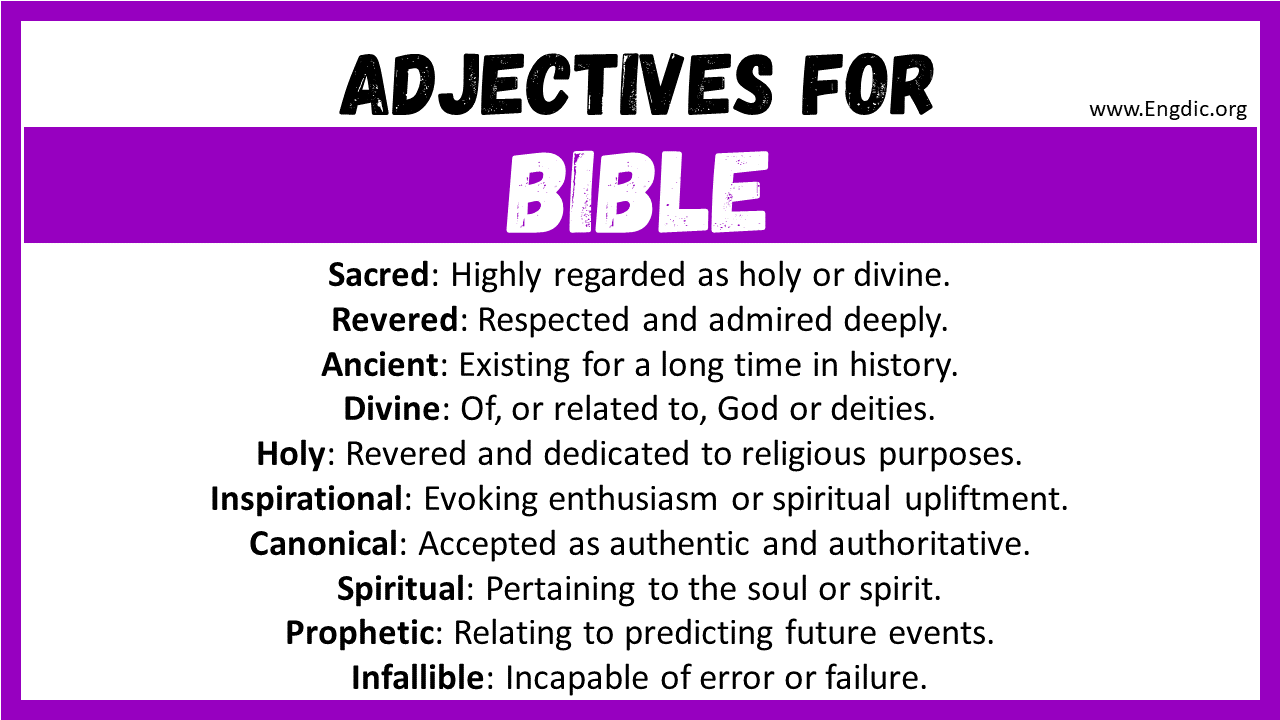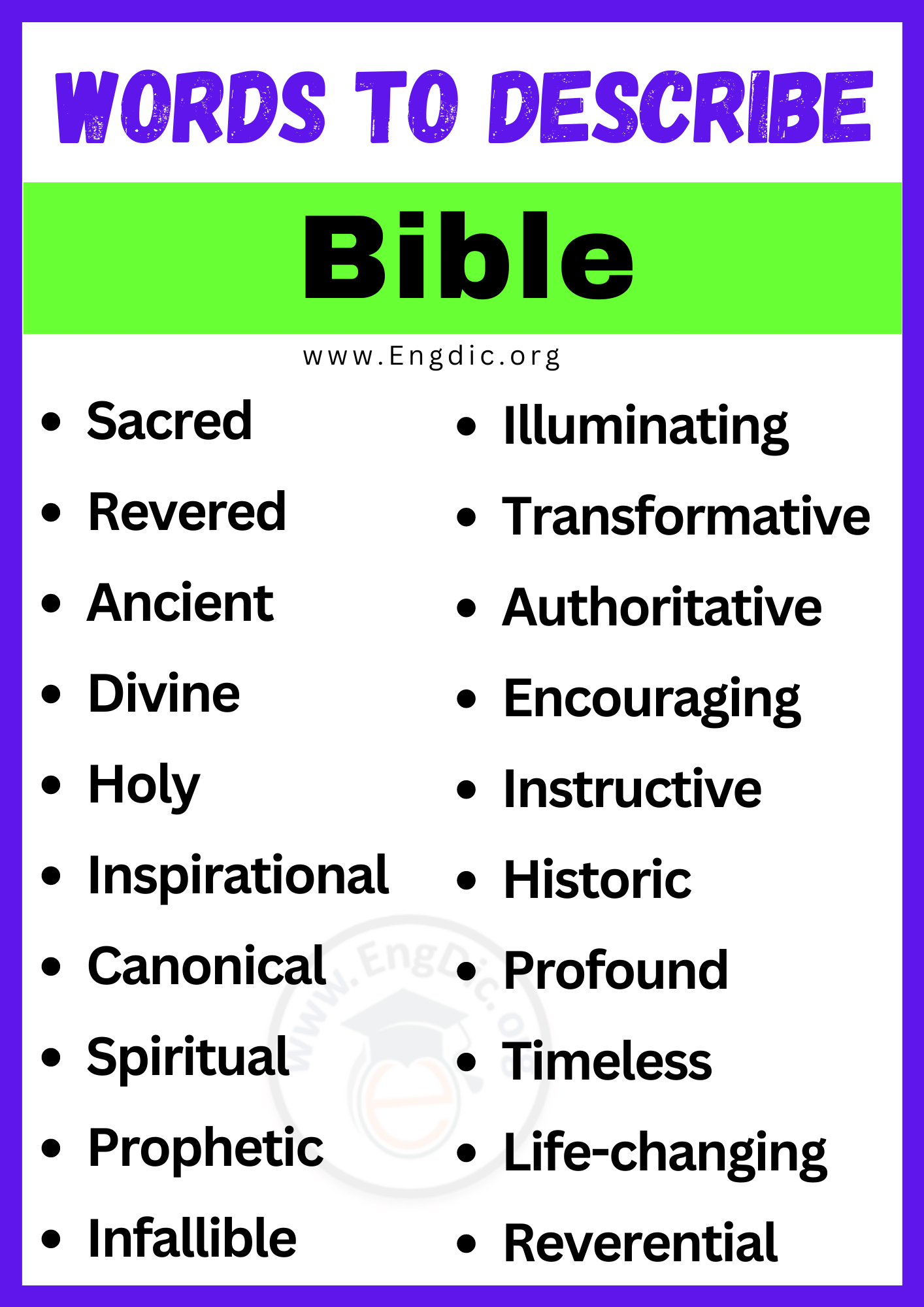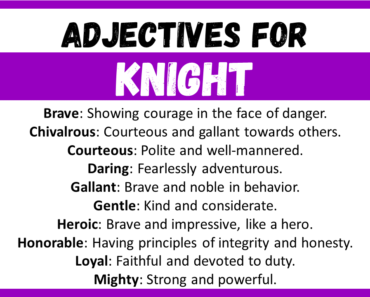The Bible, often referred to as the Holy Scriptures, is a sacred text revered by millions worldwide. It is a compilation of religious writings, including the Old and New Testaments, which hold significant importance for various faiths, primarily Christianity.
When attempting to describe the Bible, words such as “divine,” “inspiring,” and “timeless” come to mind. Its teachings are viewed as profound, guiding people’s moral compass, offering solace, and inspiring spiritual growth. This blog post delves into the diverse words that aptly capture the essence and significance of the Bible in the lives of believers.
Adjectives for Bible
Here are the 20 Most Popular adjectives for the bible:
- Sacred
- Revered
- Ancient
- Divine
- Holy
- Inspirational
- Canonical
- Spiritual
- Prophetic
- Infallible
- Illuminating
- Transformative
- Authoritative
- Encouraging
- Instructive
- Historic
- Profound
- Timeless
- Life-changing
- Reverential
Words to Describe the Bible with Meanings
- Sacred: Highly regarded as holy or divine.
- Revered: Respected and admired deeply.
- Ancient: Existing for a long time in history.
- Divine: Of, or related to, God or deities.
- Holy: Revered and dedicated to religious purposes.
- Inspirational: Evoking enthusiasm or spiritual upliftment.
- Canonical: Accepted as authentic and authoritative.
- Spiritual: Pertaining to the soul or spirit.
- Prophetic: Relating to predicting future events.
- Infallible: Incapable of error or failure.
- Illuminating: Enlightening and clarifying understanding.
- Transformative: Capable of bringing significant change.
- Authoritative: Having commanding influence and power.
- Encouraging: Providing motivation or support.
- Instructive: Offering valuable lessons or guidance.
- Historic: Of great significance in history.
- Profound: Deeply insightful and meaningful.
- Timeless: Enduring and not constrained by time.
- Life-changing: Bringing substantial alteration or impact.
- Reverential: Showing deep respect and awe.
Example Sentences for Bible Adjectives
- The sacred artifact was displayed in the temple.
- People revered the wise old monk.
- Archaeologists discovered an ancient scroll.
- The preacher shared divine messages from the scriptures.
- The church is a holy place for worship.
- Her speech was inspirational and moved the audience.
- The canonical books are considered authoritative.
- He had a spiritual experience during meditation.
- The prophecy proved prophetic as events unfolded.
- The scientist’s hypothesis was infallible.
- Her explanation was illuminating and easy to understand.
- The journey was transformative, leading to self-discovery.
- The professor’s lecture carried authoritative information.
- His encouragement gave her strength.
- The tutorial was instructive and helped me learn.
- The historic site attracted many tourists.
- His poem had a profound impact on me.
- Classic literature is considered timeless.
- Winning the award was a life-changing moment.
- The visitors showed reverential silence inside the temple.
Explore More Words:
Adjectives for Book |God |Goddess
FAQ’s
How to describe the Bible in writing?
In writing, the Bible can be described as a revered religious text central to Christianity, comprising two main sections: the Old Testament, reflecting Jewish heritage, and the New Testament, detailing the life and teachings of Jesus Christ.
Its pages are filled with historical accounts, moral teachings, poetry, and prophetic writings, deeply influencing Western literature and culture. Writers often reference it to convey themes of morality, faith, and human nature.
Where is the first Bible?
The first complete Bible, as we know it today, was not in a single location but was gradually assembled over time through the compilation of various ancient texts.
Who wrote the Holy Bible?
The Holy Bible was written by multiple authors over centuries, including prophets, apostles, and other religious figures, all believed to be divinely inspired by God.








